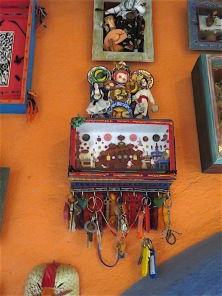Simplicity
Simplicity is something that I rarely do.
Why have only one of something when you could have two?
It takes a lot of veggies to come up with a stew,
and we’d do a lot of limping if confined to just one shoe.
Multiples are awesome. Multiples are grand.
Look how many fingers we have upon each hand.
One finger could not do the job. Neither could two or three.
Simple cannot form a hand, did not form you or me.
Simplicity’s much touted but I think it is absurd.
Who ever heard of stories comprised of just one word?
With a single raindrop, the world could not get wetter.
Sparsity may be more chic, but I like clutter better.
I don’t get minimalism. I’m a hoarder to the core.
When I ran out of wall room, I put art upon my door.
There are no piles in hallways. Hoarding need not be a sin.
I’ve built three rooms onto my house just to store things in.
With so many lovely things in life, collecting is a joy.
With life’s manifold choices, why be niggardly or coy?
At the ice cream parlor, why does one have to choose?
You need not always limit yourself just to ones and twos.
Have a scoop of strawberry and pineapple and mint.
Green tea is delicious and tequila’s heaven sent.
Load your dish with raspberry and coconut and mango.
Why do the simple two step when you could do the fandango?
In short, I am a gatherer. I have too many things.
I like to make the choices that a complex lifestyle brings.
When it comes to writing, a stuffed-full mind is fine!
Reach into words and shake them out and string them on a line.
A solitary animal will never make a zoo.
One grain of dirt, one drop of water cannot create goo.
A single cannon fired will not execute a coup.
The world just is not simple, nor am I and nor are you!
*
I’m having a yard sale of left-over words. Below is the “free box.” Take what you will (please note that some of these items have been recently used, but all have been laundered and are ready for a new user):
coy ploy toy bore core
simplicity complicity duplicity felicity
ooze booze cruise who’s whose choose lose blues news pews poos cues ruse sues twos views woos youse
doozie floozie twozie
boo goo hue loo moo new poo queue rue sue soo sioux too to you view woo you
*
Right in line with the theme of the poem, below are way too many photos. If you want to see the details, you know what to do, right? If you don’t, I’ll tell you. Just click on the first photo and click on arrows to proceed through the photo gallery. To come back here afterwards, click on the X in the upper left corner.



















